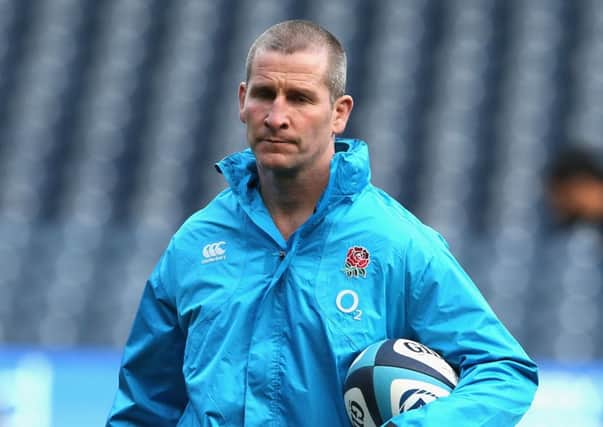Allan Massie: Scots will raise game for England


Not so: he has not only been dropped and replaced by Chris Fusaro, but left out of the squad altogether. As another Australian coach used to say, “one day a rooster, the next a feather duster”.
The odd thing is that it is Johnson who has insisted that Brown is a 7, while many who have watched him longer, and more often, than the present temporary Scotland coach have always been certain that he is much better at 6 or 8 than at 7. While one is happy that Johnson has at last picked a specialist openside, and Fusaro certainly deserves his chance, jettisoning Brown seems rash, because he is one of those rare players who almost always does the right thing.
Advertisement
Hide AdAdvertisement
Hide AdIndeed one would be happier with a back row of Brown, Denton and Fusaro. As it is, Brown is the only forward dropped, which makes him appear the scapegoat for the general failure of the pack.
A pessimist might say that it doesn’t much matter who Johnson has picked because we’ll lose anyway. He would have a point. England certainly played very much better when losing in Paris than we did when losing in Dublin, and only a dyed-in-the-wool Anglophobe could deny that Stuart Lancaster looks to have a pretty good team in the making.
The same pessimist might add that precious few Scots would get into a combined England-Scotland team, not of course that such an unhappy hybrid is likely. Nevertheless, even though decades of following Scotland have taught me that optimism is usually misplaced, the same experience instils the belief that a turn-up for the books is always possible; and certainly better England teams than this one have come to Murrayfield and lost.
Shame can be a spur, and the nature of the defeat in Dublin may encourage our players to raise their game. I doubt if they can beat England in a well-structured match, but they might do so in an unstructured one. England have a formidable and experienced pack, but some of their backs are still raw recruits. Moreover, while their half-backs, Danny Care and Owen Farrell, both played very well in Paris, Farrell indeed looking for the first time like a genuine international fly-half, both have fiery temperaments and can be unsettled. Care’s brilliance is spasmodic, and sometimes his judgement is poor. So the aim must be to get at them and harry them into making mistakes.
Billy Twelvetrees at inside centre is a fine player, but his handling is suspect and he sometimes loses the ball in the tackle. So he must be targeted, and our back-row and midfield backs must be quick on to any loose ball. England will get plenty of possession. There’s no doubt about that. Their set scrum is good and their line-out better than good. Their back-row of Chris Robshaw, Tom Wood and Billy Vunipola all carry the ball well, and Vunipola, in particular, is a hard man to stop. If anyone falls off the first tackle, and lets him get over the gain-line, alarm bells will ring.
The French did that and he set up a straightforward try for Luther Burrell. The first tackler must bring him down every time. Otherwise we’ll be in trouble. Stop him and you’ve gone some way to stopping England.
Territory is important, because if we concede penalties in our own half, Farrell will most likely kick the goal. This means that we will have to kick deep to try to pin England back, and kick better than we did in Dublin. Kicking for the corner is fine, so long as the chase is good. I would hope that Duncan Weir won’t neglect to use the Garryowen in attack. Anything can happen when you launch a high kick to land within five or ten yards of your opponents’ posts. Likewise, he should not be reluctant to try to drop a goal, especially if we are not breaking through in repeated phases of possession.
Obviously we have to protect our own ball at scrum and line-out more efficiently than we did against Ireland. Failure to do this there led more or less directly to two Irish tries.
Advertisement
Hide AdAdvertisement
Hide AdEnglish teams nearly always play to a well-drilled pattern and your best chance of beating them comes if you can disturb their rhythm and knock them out of their stride.
The stakes are high for both sides, but, I would guess, higher for England. If we lose, then, our expectations being fairly low, we can still hope to rescue our season by winning a couple of our last three matches; but, if England lose, their season is in tatters, even before they have played a match at Twickenham, because they set off with the intention, and perhaps more than the intention, of winning the championship. There is a lot of pressure on them, all the more so in a match they are confidently expected to win, and even win by a considerable margin. So if we keep the score close for an hour, anything can happen.